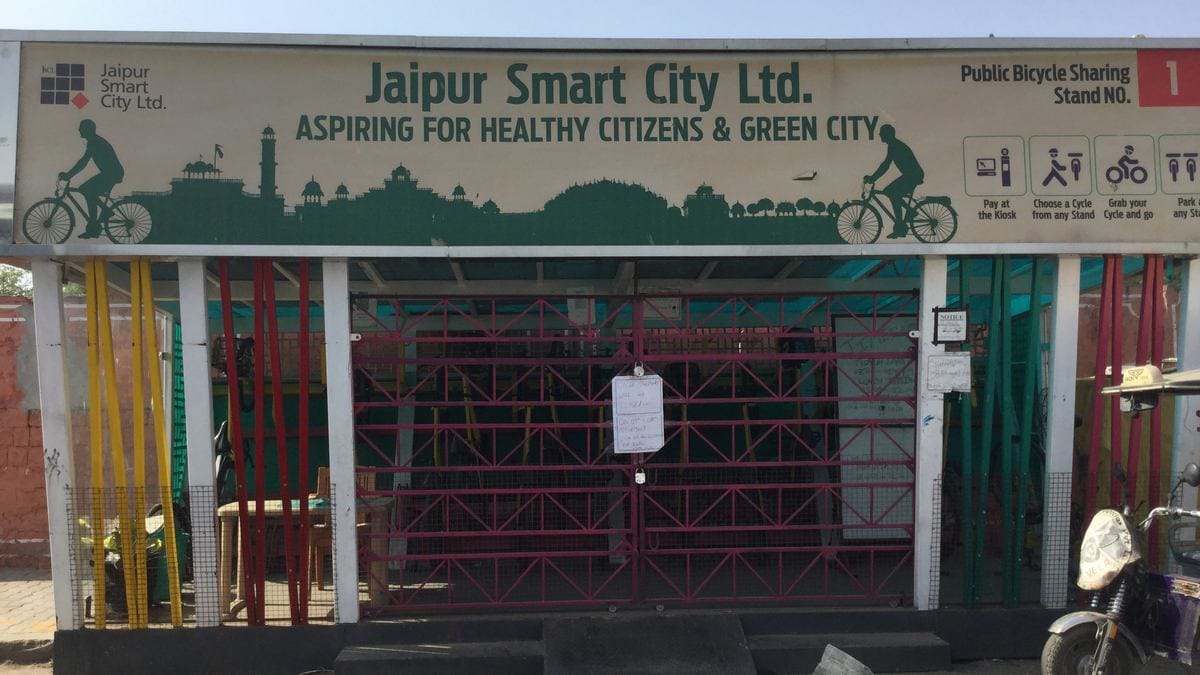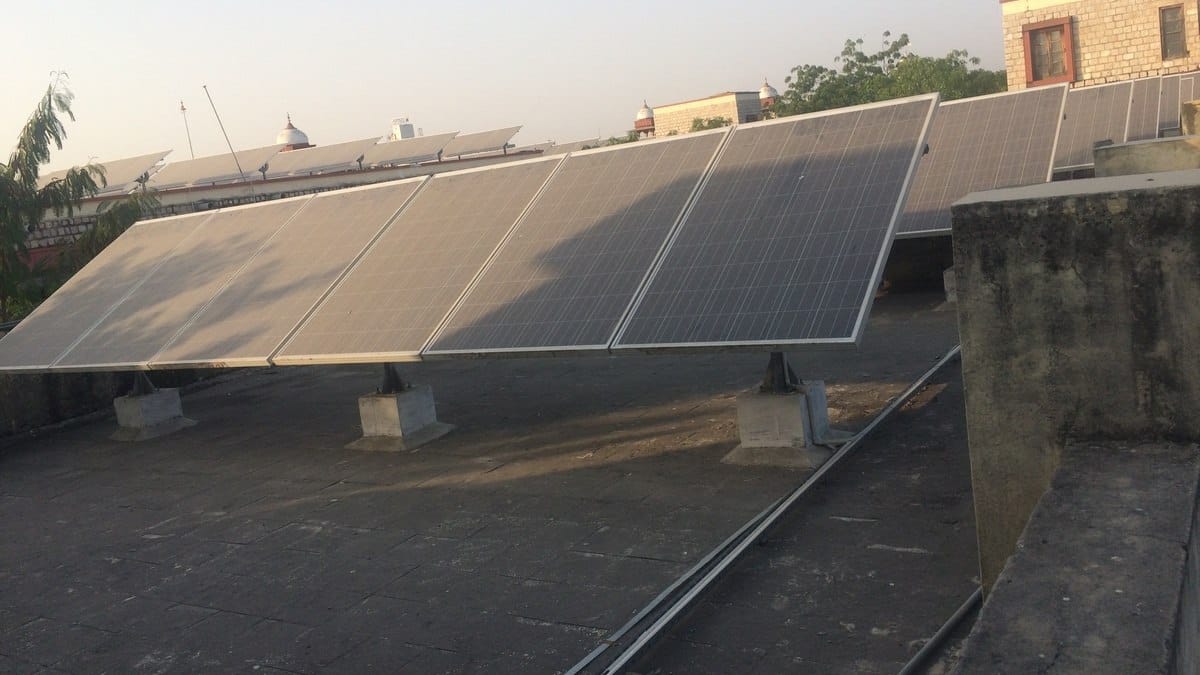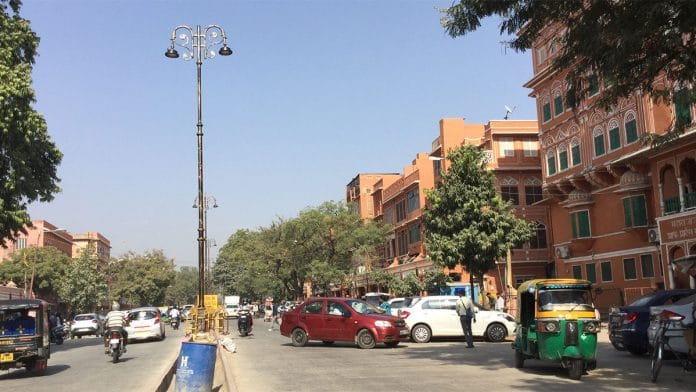Jaipur residents say city administration frittering public money to make superficial changes in the name of the smart cities programme.
Jaipur: From a distance, the Kishanpole Market, one of the busiest and oldest bazaars in the historic Walled City area looks spiffy with its freshly painted exteriors, wide cemented roads and a clear skyline sans hanging overhead wires.
The bazaar is where the Pink City’s first smart road is taking shape at a cost of Rs 17 crore as part of the Narendra Modi government’s ambitious programme to develop 100 smart cities across India. It is one of the nine old bazaars in Jaipur that has been chosen for building smart roads and façade improvement. The total cost of building smart roads in the nine bazaars is Rs 145 crore.
Stepping inside the majestic 17th century Ajmeri Gate that opens into the Kishanpole bazaar, one can see two neat rows of some 400 shops facing each other. As a first time visitor to the market, one does get carried away by the look and feel — the sandstone coloured shops, black metal streetlights, no hanging overhead wires.
The impression, though, gets dented soon enough as you step onto the half-done pavements outside the shops and see the dug up central verge. A little walk further inside the narrow bylanes of the market brings you face to face with litter and cow dung strewn along the road.
Business hit, shopkeepers angry
The anger among the shopkeepers in the locality, a majority of whom had voted for the Bharatiya Janata Party (BJP) government in 2013, is palpable.
“In 2015, the city government chose to make this road smart. But all that they have done so far in the name of smartness is digging up the old gravel road and replace it with cemented roads,” says 61-year-old Kishan Rupani, who owns a hardware shop in the market.
Three agencies are jointly implementing the Jaipur smart city project — Jaipur Smart Cities Ltd (JSCL), the special purpose vehicle set up for the project, along with Jaipur Municipal Corporation and Jaipur Development Authority.
“Tell us what purpose will a cemented road serve? The work has not been completed as yet. For six months the roads were closed here for laying underground utility ducts,” says Rupani.
He adds, “Our business has suffered badly because of the ongoing work. This, after we have endured the impact of demonetisation and introduction of GST (Goods and Services Tax).”
The electric street light poles that have been put up on the central verge were supposed to have CCTV camera, wi-fi and charging system. But work is yet to take off on the smart poles as also the landscaping of the pavements in front of the shops.
“You can’t take people for a ride like this in the name of development. Everybody understands what is happening. And it will resonate on 7 December,” adds Rupani.
Rajasthan is due to vote on 7 December to elect a new assembly.
“In the last two-and-a-half years, my business has gone down by 25 per cent. Had the authorities listened to our feedback at the very beginning, things would not have been such a mess,” says Kailashchand Khandelwal, owner of Khandelwal Misthan Bhandar.
“The poor designing is evident from the fact that they have bought the level of the road to the shops, without renovating the old drainage system. So now during monsoon the water will enter our shops,” he adds.
Angry protests from the residents in the area had forced the city government — to suspend work on the project for a few months last year.
Also read: Delhi High Court ruling saves Jaipur ‘royal family’ a lot of tax
Privilege of small pockets
City residents are also miffed that most of the smart city projects that are being implemented or those that have been completed will benefit only small pockets of the city.
Kishanpole Market, for instance, has another smart city project that was completed last year — the restoration of Rajasthan School of Arts, an 18th century heritage building.
The JSCL spent Rs 1.7 crore on restoring the small heritage building to its old glory. Now, a museum has been opened on the ground floor.
“No one is saying don’t restore heritage buildings. But if you are getting Rs 2,400 crore to give an urban makeover to the city, it should be used more inclusively,” says Rajiv Gupta, retired sociology professor, Rajasthan University.
“City development is important but it’s the resident who should decide what they require most. The government cannot decide unilaterally based on borrowed concepts from the west,” says Gupta.
Similar projects, benefitting just a small segment of population, dot the city landscape. These include installing solar panel on the rooftop of Rajasthan University.
Implementation a challenge
A few kilometres away from the Kishanpole Market, Suresh Kumar Ola, JSCL chief executive officer, is not oblivious to the challenges that he faces but sounds optimistic.
“Any urban restoration projects, especially in heavily congested areas such as the Walled City is not going to be easy. There has been delay for various reasons in completing the Kishanpole Market project but we have now completed 99 per cent of the work,” he says.
Ola, who took charge as CEO six months ago, says that what makes carrying out civil work in the old city more difficult is the fact that you effectively get five to six hours to work everyday.
“In such maximum density areas like Kishanpole Market, one can work only after night once the market shuts down. Also in a heritage area one has to be very careful while undertaking digging work,” adds Ola.
12 projects completed, out of 62
Jaipur was among the first bunch of 20 urban centres across India that was chosen in 2015 by the Union Ministry of Housing and Urban Affairs to be developed into a smart city. Jaipur is among the four cities in Rajasthan — Udaipur, Ajmer and Kota being the other three — selected to be developed as smart cities.
As part of the programme, 62 projects worth Rs 2,401 crore were finalised in the city in the same year.
Under the smart cities programme, the Centre and the states jointly share the budget. While the Centre gives 50 per cent of the funds, respective states and urban local bodies chip in with the remaining 50 per cent.
So far, just 12 projects worth Rs 1,376 crore have been completed. These range from smart classrooms with interactive whiteboard, projectors, computers and biometric attendance system, rejuvenation and improvement of heritage buildings like the Rajasthan School of Arts and Ram Nivas Bagh to public bicycle sharing scheme, constructing smart toilets and door to door garbage collection.

Some good, many poorly conceived projects
City residents say that some projects under the programme, like building smart classrooms, are good and will go a long way in improving school education.
“Smart classrooms will help students in the digital age. But such projects are few and far between,” says a government health department official who did not wish to be named.
Another senior official of Rajasthan Urban Drinking Water Sewerage and Infrastructure Corp. Ltd, a government agency that is also involved in the projects, says the problem is that the city government has clubbed everything together and put under the smart cities programme.
“Some components are good but many projects are just an superficial attempt to improve the city without addressing the core issues,” says the second official on condition of anonymity.
“There is a municipality for ensuring cleanliness, public works department for building roads. Why should you put these under smart cities program?” adds the second official.
The public bicycle sharing scheme is a case in point. The city administration had to set up 20 docking stations across the city for parking the bicycle after use. But so far just two have started — one near Ram Nivas Bagh and another at JLN Circle.
So, anybody picking up bicycle from these points has to come all the way back to the same docking points to deposit it. As a result, the bicycles are rarely used and the docking stations mostly remain closed.
“It is not feasible to pick up a bicycle from Ram Nivas Bagh, go to your destination and come all the way back to return it to the docking station,” says Inder Singh Choudhury, a third year accountancy student at Rajasthan University.
“It defeats the whole purpose,” he adds.
Ola concedes that depositing the bicycles is a hassle now, but adds that things will improve once all the 20 docking stations get set up by December.
Ritu Choudhary, 23, another Rajasthan University student, says that the smart city projects are a reflection of how public money is being wasted. “Just because the state government is getting money does not mean that it should misuse it. It’s your and mine hard earned money.”
She adds, “Instead of putting it in some poorly designed project, the government should have used the money to improve basic services like sewerage and drainage facilities in the city.”

Also read: Jaipur didn’t need metro network till 2025: CAG questions hasty move by Rajasthan govt
Need for flexibility
Ola says he has become used to the criticism. “I welcome criticism as it helps us know where we are going wrong or where there is a need for improvement.”
However, he admits that the smart city programme could have done with more flexibility.
“Things change on the ground. For instance if I want to include some new project, which is more feasible now then two years ago, I can’t as the 62 projects have already been finalised.”
Government officials admit that the future course of Jaipur’s smart city makeover will depend on the new government, post 11 December when assembly elections results will be announced.
“No doubt it’s a Central government project with fixed budget and time frame. But whether work will pick pace, bottlenecks get resolved expeditiously or a rethink is done will depend on the new government and how it sees the programme,” says a senior Rajasthan government official who did not want to be named.






